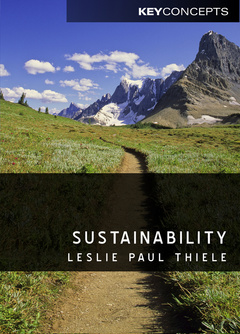Description
Sustainability
Author: THIELE Leslie Paul
Language: English
Subjects for Sustainability:
Approximative price 90.30 €
Subject to availability at the publisher.
Add to cartDescription
/li>Contents
/li>
The pursuit of sustainability has generated lifestyle changes for
individuals across the globe, widespread initiatives within civil society
and business, historic policies for municipal, regional, and national
governments, and crucial protocols and agreements by international
organizations. Increasingly, sustainability provides a common language and
goal for diverse peoples and nations. Yet the meaning of sustainability
remains unsettled, and the term frequently serves as a PR strategy--a
green veneer for business as usual--rather than a driver of fundamental
change.
Leslie Paul Thiele's accessible yet thorough book provides a broad-ranging introduction to the concept and practice of sustainability today. It addresses the history, scope, and contested meanings of sustainability as an ethical ideal, an ascendant ideology, and a common sense approach to living in an ever more crowded world of increasingly scarce resources. Key topics covered include environmental health and ecological resilience, the promise and unintended consequences of technology, political and legal challenges, economic limits and opportunities, and cultural change.
Unlike most other approaches to this crucial topic, Thiele argues that sustainability requires innovation and adaptation as much as the conservation of resources. His book will be a valuable resource for students in a broad range of courses, including environmental studies and related areas, as well as general readers keen to grapple with one of the most pressing issues of our times.
Leslie Paul Thiele's accessible yet thorough book provides a broad-ranging introduction to the concept and practice of sustainability today. It addresses the history, scope, and contested meanings of sustainability as an ethical ideal, an ascendant ideology, and a common sense approach to living in an ever more crowded world of increasingly scarce resources. Key topics covered include environmental health and ecological resilience, the promise and unintended consequences of technology, political and legal challenges, economic limits and opportunities, and cultural change.
Unlike most other approaches to this crucial topic, Thiele argues that sustainability requires innovation and adaptation as much as the conservation of resources. His book will be a valuable resource for students in a broad range of courses, including environmental studies and related areas, as well as general readers keen to grapple with one of the most pressing issues of our times.
- Acknowledgments
- Preface
- Introduction
- Chapter One: Sustainability and Time
- Chapter Two: The Geography of Sustainability
- Chapter Three: Ecological Resilience and Environmental Health
- Chapter Four: Technological Solutions and their Problems
- Chapter Five: The Political and Legal Challenge
- Chapter Six: Sustaining Economies
- Chapter Seven: Culture and Change
- Conclusion
- Bibliography
- Notes
© 2024 LAVOISIER S.A.S.



